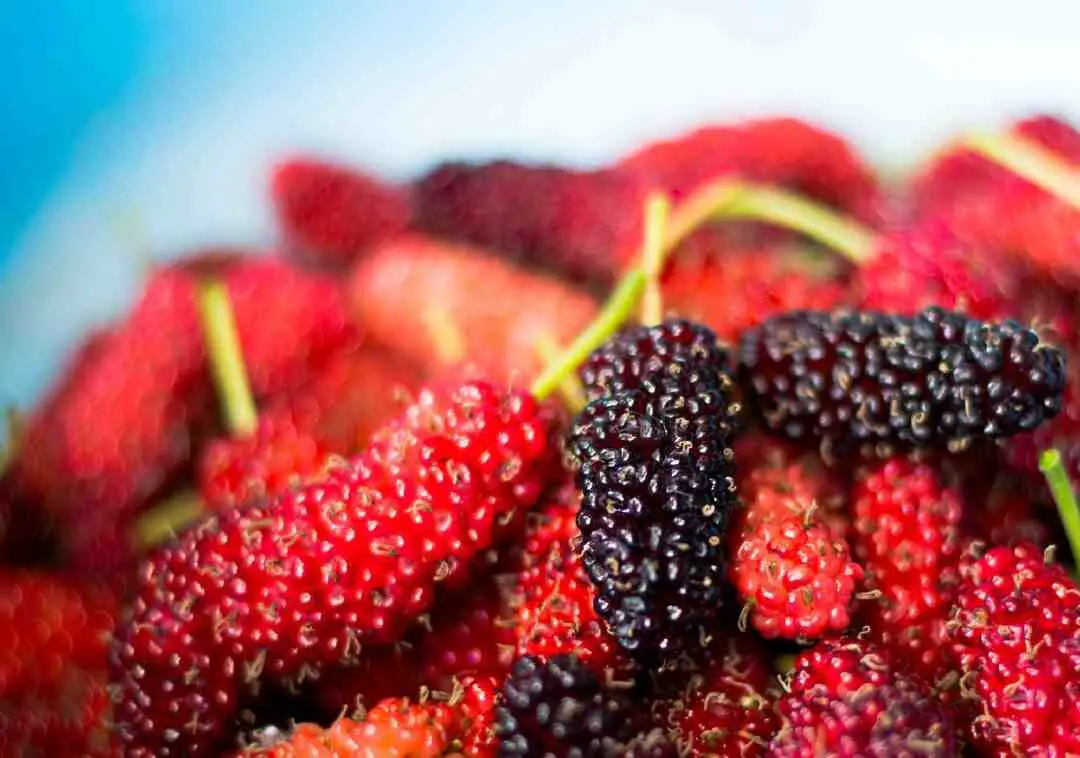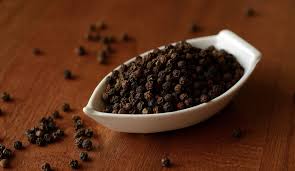Can Dogs Eat Mulberries?
Perhaps, you’re probably relishing and snacking on some mulberries. But, one problem – your dog is seated right beside you, staring and begging to get a taste. Having found me in such a scenario before, one question that came to mind was “can dogs eat mulberries?” And this initiated extensive research into this discourse. With that said, this article contains comprehensive information on Mulberries and their potential effects on dogs.
Are mulberries poisonous to dogs?
No! Mulberries, are not, in any way, harmful to a dog’s health. To corroborate this point, the American Society for the Prevention of Cruelty to Animals, ASPCA, classified mulberries as non-toxic for dogs.
However, the only potential downside I’ve observed is an upset stomach. And this mostly occurs in cases of overeating. Why? As we know it, mulberries are a high-fiber diet, and as such, eating them excessively can ultimately result in the loose stool (and a lot more than anyone expects!).
Again, a few exceptions like unripe mulberries can pose considerable risk to mulberry dog’s health. In a nutshell, a dog eating mulberries must be based on striking the right portion balance and eating them the right way, as we will cover later in this guide.
Now, the direct answer to “can dogs eat mulberries?” is a Yes. Dogs can eat mulberries. In fact, mulberries actually offer a plethora of health benefits for them. They contain vitamins and minerals and are easy on blood sugars.
While I prefer the white mulberries and black mulberries (those native to china), red mulberries are also perfectly safe to eat for dogs. However, they can result in hallucinations when ingested in their unripe form.
How can dogs eat mulberries?
The relationship between mulberries and dogs is a somewhat flexible one. Dogs can consume this natural and non-toxic berry in multiple ways that can go through their digestive tracts without complications. These include:
Fresh mulberries
As a rule of thumb, I generally recommend fresh mulberries straight off the branch are the best for dog consumption. At this point, they are yet to be exposed to toxins and potentially harmful external elements.
Notwithstanding, consuming fresh mulberries shouldn’t negate the principle of a balanced portion. Dogs should never consume them in high quantities due to their sensible stomachs. So, always consider the limits and act on them accordingly.
Dried Mulberries
While dried mulberries remain non-toxic they are generally characterized by an increase in flavor intensity. This is due to the evaporation of the liquid component. As such, never allow dogs to ingest them by the handful, as they could easily get upset stomach since they now need to eat more before getting filled up.
In what form are mulberries bad for dogs?
Not every form of mulberries is okay for dogs. Dog eating mulberries should be a very controlled event and the following forms of mulberries should be actively avoided:
Cooked Mulberries
While cooking your mulberries doesn’t alter the fruit in itself, it is generally advisable not to offer them to dogs. Typically, I cook mulberries with multiple ingredients, including mixes of sugar, flour, and several other delicious ingredients that may not be conducive for dogs consumption.
For this reason, we generally advise that dogs should not be fed with cooked mulberries because they can serve as a trigger to multiple pathologies within their system.
Unripe mulberries
Can you eat mulberries when unripe? Well, No. So, neither should dogs. Although consuming unripe mulberries will not immediately land them in an emergency ward, they can easily cause upset stomachs even more than the ripe ones.
What to do when my dog eats unripe mulberries?
Unripe mulberries are known causes of hallucinations, nausea, as well as committing, and as such, it is important to be cautious about dogs taking them in. But when a dog ultimately eats unripe mulberries, with antacids, the symptoms typically leave after 24 hours. However, if symptoms persist, reach out to a veterinarian as soon as possible.
Note: always get professional medications before feeding your doggy with any medications!
Baked mulberries
One thing I learned so late was, never bake mulberries into a dog’s treat. Doing this could lead to adding more than enough mulberries into the doggy treats, and of course, causing an upset stomach.
In addition to this, anytime you bake mulberries, it degrades some beneficial elements, including vitamins and minerals. This ultimately deprives the dogs of reaping maximum benefits from these treats.
Why are mulberries good for dogs?
Although not every berry is okay for dogs, mulberries especially offer a vast range of benefits for them. Here are a few reasons why we recommended that dogs eat mulberries – of course, in small portions.
Caters to digestive health
Mulberry is a fiber-rich fruit, consisting of both soluble and insoluble variations. This can facilitate proper bowel movement in dogs, ultimately easing digestion. In other words, it can significantly minimize the chances of stomach upset and indigestion.
Facilitates healthy blood circulation
Besides fibers, mulberries contain a great deal of Iron, which promotes the development of red blood cells. With this, the dog can produce enough red blood cells to ensure that oxygen gets to every cell in its body.
Great antioxidants
Antioxidants minimize free radicals-induced damages. Mulberries mainly contain Resveratrol, which is popular for its immense effects on longevity and aging. In addition to this, they contain other antioxidants that can minimize fatigue and oxidative stress.
Prevents tumor growth
Although GIT cancers are somewhat rare in dogs, they usually manifest in dogs over 6 years. However, mulberries contain anthocyanins, which are well known for preventing tumor formation. This can potentially prolong the dog’s health.
Minimizes chances of obesity
Although obesity is somewhat rare for active pets, it still usually finds its way in. Mulberries contain active ingredients that can control a dog’s glucose levels and help steer clear of fatty acids and inflammations induced by obesity.
Promotes healthy vascularity
Healthy blood vessels are integral to normal blood flow and body functioning. Mulberries contain resveratrol which can also improve nitric oxide production. Nitric oxide is important to promote healthy blood vessels.
Immense brain protection
According to relatively recent research from NCBI, mulberries can positively affect the brain. In a nutshell, they repair brain cells and improve the cognitive abilities of dogs.
Potential adverse effects of mulberries consumption in dogs
Since research on this discourse is limited, it is somehow hard to evaluate mulberries’ safety for every dog breed. Nonetheless, there is enough data to support that mulberries are good for dogs as long as moderation is ensured.
In the absence of moderation, here are some mulberry poisonous or adverse instances:
Coat staining
This isn’t directly a poisonous instance, still, it’s a downside to mulberries. Similar to blackberries, they stain anything their juice touches. So, I try everything to prevent my dogs from wandering around where these fruits fall. Trust me, taking them off is no walk in the park.
Upset stomach
Eating mulberries gives me this addictive feel, like it triggers dopamine release, making it so tempting to stop. This is even truer for dogs. The fruit is, without a doubt, a tempting and sweet treat. However, excess uptake can cause diarrhea in dogs.
Allergies
Although this is not so common, mulberries can trigger some form of allergic reactions in dogs that are sensitive to either their pollens or juices.
Are mulberry trees poisonous to dogs?
In other words, can dogs consume mulberry leaves? Well, multiple studies indicate that mulberry leaves are filled with immense medicinal properties used to treat skin irritations, throat infections, and several other pathologies.
Besides, mulberry leaves are not toxic to dogs. However, taking them in excess can irritate their stomach leading to digestive complications. I usually recommend that dogs stay away from mulberry leaves. But if they must eat them, let it be just a few to prevent potential side effects.
How to ensure that dogs do not overeat mulberries?
Stating the obvious, mulberries are everywhere! Their trees spread across various states. In fact, I have one in my yard, so you probably do also. In this case, it comes increasingly difficult to prevent dogs from overconsuming these fruits.
However, with the following tips, one can always ensure that dogs do not uncontrollably gobble these berries.
As someone who has a mulberry tree in the garden, I do well to pick them up constantly anytime they fall. This considerably minimizes their number, prevents them from fermenting, and makes them unavailable for dog consumption.
Again, when going on a walk with the dog, I make sure the leash is properly tightened to prevent him from eating those present on the street or pavements.
In what quantity are mulberries safe for dogs?
The answer to this varies depending on the individual dog. From previous experiences, it is best that you start slowly when feeding a dog for the first time. This will prepare their digestive system and get them accustomed to the new food without stress.
Then, a gradual increase in the treats may follow, until they are able to consume a palmful of mulberries. However, one thing I wish I knew was dogs can still develop diarrhea even ager building tolerance. When this occurs, you can always minimize the quantity they eat and stick to this going forward.
Another important aspect that needs attention is rinsing. Thoroughly rinse them first before feeding them to dogs. Also, never include substances that can potentially surge the acidity of their digestive tracts. These include foods/ingredients high in salt and sugar, such as French fries.
Potentially toxic berries for dogs
While the answer to “are mulberries toxic to dogs?” is a No, many other berries across the country can be dangerous and toxic to the beautiful pet’s health. They could lead to various health complications, including breathing difficulties, seizures, drooling, and other pathologies.
With that said, it is important to pay utmost attention to them and put every precautionary mechanism in place to prevent their consumption. These berries include; holly berries, dogwood berries, gooseberries, salmonberries, pokeberries, juniper berries, mistletoe berries, among others.
Mulberry substitutes for dogs
As we know it, dogs can consume several things, and of course, a moderate intake of mulberries will pose no harm to them. However, if we are looking for potential substitutes to include in their diet, here are a few:
- Yogurt
- Pineapple
- Lettuce
- Cabbage
- Watermelon, etc.
Final thoughts
Mulberries, just like several other fruits and a few exceptions, are very much safe for dog consumption. But remember, moderation is key! The addictive, tempting and sweet fruit offers a plethora of health benefits for dogs. However, they don’t need them every day. An occasional treat is the best.
Summarily, make sure to observe your pooch for any adverse reactions after consuming mulberries. In cases where they indicate allergies or other negative feedbacks, avoid feeding them anymore and do well to reach out to your vet asap.
Credit: Photos by Boykat, Janaprusova, MarieXMartin and Kadirkritik from Pixabay.






